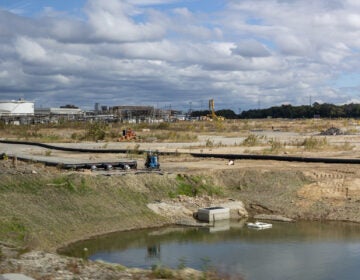Open records office: DVRPC covered under Right to Know Law

In a landmark ruling, the state’s Office of Open Records has decided that the Delaware Valley Regional Planning Commission is covered under the state’s open record law.
This means that most documents produced by the bi-state agency, which coordinates planning and infrastructure policy in Southeastern Pennsylvania and parts of South Jersey, will be available to anyone who requests them.
The open record law, called the Right to Know Law, spells out which government documents are available to the public upon request.
The ruling came in the midst of a contentious battle between the commission and Pennsylvania Transit Expansion Coalition, or PA-TEC, which opposes the construction of more parking garages at SEPTA regional rail stations and has become highly critical of regional infrastructure spending.
The group issued a series of three records requests under the law, to DVRPC in April and May seeking internal e-mails related to Jenkintown ― the site of a proposed parking garage. The group also sought e-mails between DVRPC leadership and the Regional Citizens Committee, the commission’s citizen advisory group and information relating to possible changes to the RCC.
Changes were discussed at a contentious May DVRPC Board meeting in response to battles that have erupted at RCC meetings between the group and RCC leadership.
PA-TEC leader Jon Frey said the group issued the requests in part to figure out the source within DVRPC of the hostility the group has met with.
DVRPC denied the requests, and PA-TEC appealed to the Office of Open Records. On appeal, the commission relied on an earlier Commonwealth Court ruling saying that the commission wasn’t covered under the law.
But on July 19, the office overturned that ruling, with appeals officer Audrey Buglione writing that the law had been significantly altered since the original Commonwealth Court ruling, when it only covered bodies that performed “essential government functions” ― which the DVRPC, as an advisory body focused around planning issues, doesn’t.
“Among other revisions, the RTKL eliminated the requirement than an entity perform an essential governmental function in order to be considered an agency,” she wrote.
And the current version of the law covers multi-state agencies and independent agencies. Buglione wrote that Commonwealth Court has already classified the DVRPC as an “independent agency” ― meaning it’s covered under the law.
Beyond these particular requests, this ruling means that documents produced by the DVRPC will be presumed public and that the commission will only be able to refuse to release documents under certain narrow exceptions spelled out in the law.
The rulings also brushed aside most of the other objections DVRPC raised to releasing the documents, including that the requested documents included privileged “pre-decisional” documents and releasing the e-mails would have “a chilling effect” on citizen participation because they involve e-mails exchanged with leaders of the RCC, who aren’t employees of the commission.
It ordered the DVRPC to comply with PA-TEC’s request and release almost all of the documents the group asked for. DVPRC has 30 days from the date of the rulings to produce the documents or file an appeal.
DVRPC spokeswoman Candy Snyder, who also serves as the commission’s open records officer, said the DVRPC was reviewing its options and couldn’t comment.
RCC chairwoman Aissia Richardson, whose e-mails with DVRPC leadership formed a central part of the dispute, said she couldn’t comment on the substance of the ruling but said that “we would have sit down and talked with” PA-TEC if they had taken a less-confrontational approach.
“There’s nothing in the e-mails that hasn’t been said at any of the [RCC] meetings, and I have been an advocate for transparency and accountability for quite a while,” she said.
For its part, PA-TEC is still awaiting the documents, according to Frey.
“They have yet to produce a single record that we asked for in the requests,” he said.
The group is also involved in ongoing open records battles with SEPTA and Montgomery County regarding information regarding the proposed regional rail extension to Wawa and proposals to restore regional rail service to Newtown. PA-TEC won its initial appeals to the Office of Open Records, but the authority and county appealed the decisions to Common Pleas and Commonwealth courts.
WHYY is your source for fact-based, in-depth journalism and information. As a nonprofit organization, we rely on financial support from readers like you. Please give today.






